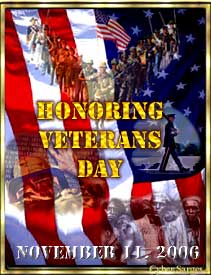




Veterans
Day is dedicated to remembering the service and sacrifices that U.S. military
service members have made for their country, including the 25 million living
veterans in this country.
HONOR THEM, NEVER FORGET THEM and remeber..it is they who gave you FREEDOM!!
This
legal federal holiday is observed on November 11.
The History of
Veterans Day
November 11, or what has come to be known as Veterans
Day, was originally set as a U.S. legal holiday to honor Armistice Day -- the
end of World
War I, which officially took place on November 11, 1918. In legislature
that was passed in 1938, November 11 was "dedicated to the cause of world
peace and to be hereafter celebrated and known as 'Armistice Day.'" As
such, this new legal holiday honored World War I veterans.
In 1954, after having been through both World
War II and the Korean
War, the 83rd U.S. Congress, at the urging of the veterans service
organizations, amended the Act of 1938 by striking out the word
"Armistice" and inserting the word "Veterans." With the
approval of this legislation on June 1, 1954, November 11 became a day to honor
American veterans of all wars.
In 1968, the Uniforms Holiday Bill insured
three-day weekends for Federal employees by celebrating four national holidays
on Mondays: Washington's Birthday, Memorial Day, Veterans Day, and Columbus
Day. Under this bill, Veterans Day was moved to the last Monday of October.
Many states did not agree with this decision and continued to celebrate the
holiday on its original date. The first Veterans Day under the new law was
observed with much confusion on October 25, 1971.
Finally on September 20, 1975, President
Gerald R. Ford signed a law which returned the annual observance of Veterans
Day to its original date of November 11, beginning in 1978. Since then, the Veterans
Day holiday has been observed on November 11.
Other
countries honor their veterans each year on November 11, although the name and
types of commemorations differ somewhat from the U.S. holiday. Canada and
Australia observe "Remembrance Day" on November 11, and Great Britain
observes "Remembrance Day" on the Sunday nearest to November 11.
There are similarities and differences between these countries' Remembrance
Days and America's Veterans Day. Canada's observance is similar to the U.S.
celebration, but unlike in the U.S., many Canadians wear red poppy flowers on
November 11 in honor of their war dead. In Australia, Remembrance Day is
similar to America's Memorial Day, a day to honor that nation's war dead. In
Great Britain, the day is commemorated by church services and parades of
ex-service members in Whitehall, a wide ceremonial avenue leading from London's
Parliament Square to Trafalgar Square. A two-minute silence is observed at 11
a.m., to honor those who lost their lives in wars.
Celebrating the Holiday
If the November 11 holiday falls on a non-workday --
Saturday or Sunday -- the holiday is observed by the federal government on
Monday (if the holiday falls on Sunday) or Friday (if the holiday falls on
Saturday). Federal government closings are established by the U.S. Office of
Personnel Management; a complete schedule can be found here. State
and local government closings are determined locally, and non-government
businesses can close or remain open as they see fit, regardless of Federal,
state or local government operation determinations.
United States Senate Resolution 143, which
was passed on August 4, 2001, designated the week of November 11 through
November 17, 2001, as "National Veterans Awareness Week." The
resolution calls for educational efforts directed at elementary and secondary
school students concerning the contributions and sacrifices of veterans.
Courtesy of
www.military.com 11/2001
